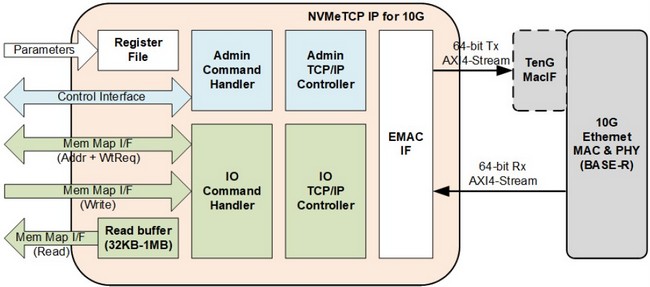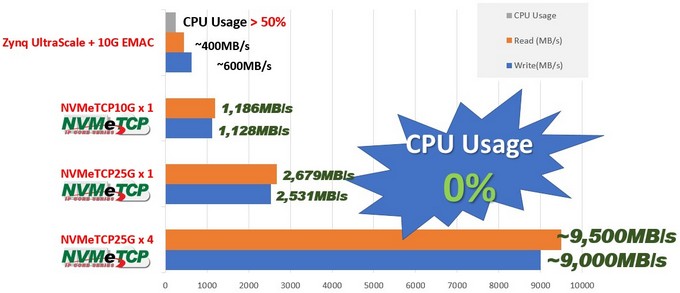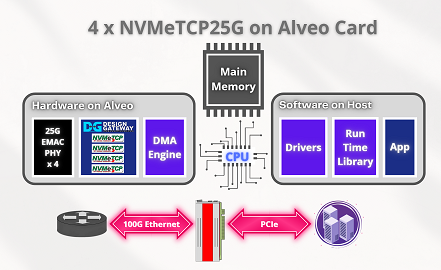NVMe over TCP IP coreEnd-to-End NVMe-oF TCP connectivity with no CPU!

NVMeTCP IP is the standalone host side NVMe Over Fabric (NVMe/TCP) controller with
no CPU and external memory required. Enabling very high-performance remote
access to NVMe-oF Storage Server by simple user logic. Greatly reduce design
complexity and development time. Allowing your FPGA Card/Board to get access
to the existing NVMe-oF storage infrastructure remotely and directly over
FPGA’s network interface with maximum possible performance.
This IP core license includes the reference design for AMD FPGA boards.
It helps you to reduce development time and cost.
Features
- NVMe/TCP (NVMe over TCP) host controller (Initiator), based on NVMe-oF specification rev 1.1 and NVMe specification rev 1.4
- Access one NVMe SSD on the target (Subsystem), selected by NVMe name (NQN)
- Command: Write and Read
- High performance:
- NVMeTCP25G-IP: Write = 2500MB/s, Read = 2600MB/s (1MB buffer)
- NVMeTCP10G-IP: Write = 1200MB/s, Read = 1200MB/s (1MB buffer)
- Data interface: Memory-mapped interface
- Data size per command: Fixed at 4 Kbytes
- Maximum command: 256 or less, limited by Read buffer size for Read command
- Configurable Read buffer size: 32Kbytes (up to 8 Read Cmd) - 1Mbytes (up to 256 Read Cmd)
- Supported NVMe/TCP target:
- IOCCSZ (I/O Queue Command Capsule Support Size): More than or equal to 4160 (1040h)
- MQES (Maximum Queue Entries Supported): More than or equal to 256 (100h)
- MAXCMD (Maximum Outstanding Commands): More than or equal to 256 (100h)
- Authentication: Not required
- Networking: 10Gb Ethernet speed in the same network for transferring ARP request/reply packet by using jumbo frame packet
- Ethernet MAC interface: 64-bit AXI4 Stream interface at 156.25 MHz
- User clock frequency: 156.25 MHz, the same clock as EMAC interface
- Available reference design: KCU105/ZCU102/ZCU106 board
- Customized service
- NVMe/TCP Target in different network that cannot transfer ARP packet to get Target MAC address
- The network that does not support jumbo frame packet
Block diagram

Performance Comparison

Document download
YouTube Video
Documents for each Device families
| Support Devices | Versal VCK190, Alveo U50 Zynq UltraScale+ ZCU102, ZCU106, ,Kintex UltraScale+, Kintex UltraScale KCU105 |
|||||
| IP core & Option | Datasheet | Reference Design Document | Demo Instruction Document | FPGA Board Set up Document | Free Evaluation demo file | |
| NVMeTCP25G-IP | Rev2.00 | Rev2.00 | Rev2.00 | Rev1.01 | VCK190 KCU116 SilicomKU15P |
 |
| Cloud Accelerator Demo | - | - | Rev1.00 | Rev1.00 | Alveo U55C | |
| 4 Session Demo | - | Rev1.0 | Rev1.0 | Alveo U50 |  Part1: Overview  Part2: Demo |
|
|
|
||||||
| NVMeTCP10G-IP | Rev2.00 | Rev2.00 | Rev1.02 | Rev1.02 | VCK190 KCU105 ZCU106 ZCU102 |
 |
Free Bit file for evaluation
 Free evaluation demo is available on AMD FPGA boards.
Free evaluation demo is available on AMD FPGA boards.4ch NVMeTCP25G demo on Alveo Accelerator Card

Design Gateway provide 4 x NVMeTCP25G reference design on Alveo Card to fully utilize 100GbE (25G x 4) Ethernet interface port on Alveo Card and demonstrate NVMe/TCP Host performance on Alveo Card with NVMeTCP Target.
Each NVMeTCP connection performance can achieve 2GB/s or more depended on NVMeTCP Target. This reference design is available for NVMeTCP25G core customer for evaluation and shorten your development time.
Merits & Advantages of NVMeTCP IP core
- Simply attach the remote NVMe SSD Storage to your FPGA Card/Board without PCIe hard IP and/or MPSoC
- Very high performance with over 95% network bandwidth utilization.
- Enabling NVMeoF(NVMe/TCP) host side on your FPGA with no CPU and DDR
- Scalable storage capacity & performance with multiple IPs implementation
Application example
.jpg) |
AutomotiveIn modern vehicles, FPGAs often handle data from sensors, cameras, and radar systems. With our NVMeTCP IP Core, this data can be processed in real-time and then sent via 10G or 25G Ethernet to a remote NVMeTCP storage server. This approach not only saves space and power on the vehicle but also ensures that massive amounts of data are stored reliably and efficiently. More solution |
.jpg) |
AerospaceAt satellite ground stations, FPGAs manage the downlink of data from satellites. By utilizing the NVMeTCP IP Core, this critical data can be quickly transmitted over 10G or 25G Ethernet to remote storage servers. This method allows for the secure and efficient storage of large volumes
of satellite data without compromising on performance or scalability. |
About price and licence of this IP core, please contact Design Gateway.
Alliance Partner

Design Gateway Co., Ltd.
Head Office3-23-17 Naka-cho, Koganei, Tokyo, JAPAN
R&D
89/26 Amornpan 205 Tower1, 18th floor, Ratchadapisek7 (Nathong) Alley, Ratchadapisek Road, Din Daeng, Bangkok, 10400 THAILAND
AI Lab
Faculty of Engineering, Chulalongkorn University, 12th floor, Engineering 4 Building (Charoenvidsavakham), Phayathai Rd., Wang Mai, Pathumwan, Bangkok, 10330 THAILAND




